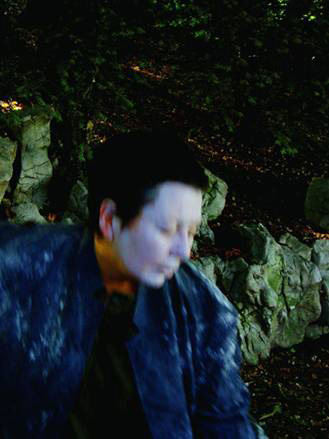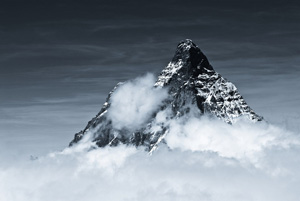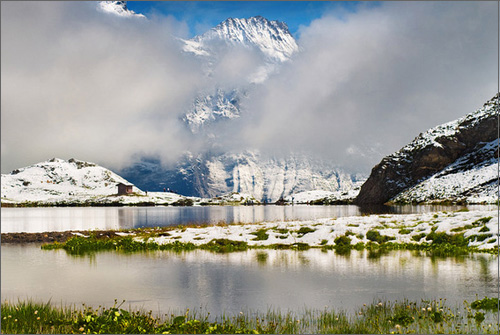The Association for Cultural Exchange is currently supporting the following endeavor. Information about the project organizers and participants will be provided upon request.
Proteus Project
Holding Fast Arising Form
![]()
The Ancient Greeks believed that the god Proteus, son of Poseidon, could foresee the future. He could also change shape to avoid being caught. He would reveal his prophetic vision only to those capable of containing him. To capture Proteus, one was required to hold him fast as he tried to escape by changing shape swiftly, mercurially - from lion to leopard, to wild boar, from tall tree to raging river and then, successfully contained, back to his original form. At this point he was obliged to tell you the truth, to answer your questions, to foretell the future. In modern times, the Swiss psychiatrist, Carl Gustav Jung, defined the mythological figure of Proteus as a personification of the unconscious; that is, of all that is not known (and yet can reveal what we seek).
To hear truth, to see what is not known, we are asked to contain radically shifting forces, to move with the groundlessness of being. From here, new vision and deeper understanding can arise. We build new ground.
Through direct experience and personal research, the Proteus Project wishes to explore the teachings of this Greek myth, discovering further ways to engage the unknown for greater vision and understanding.
Key phrases for this project are
the art and skill of perceiving sensation
the body as our field of perception: the body becomes the ear of listening when perceiving experience
the wisdom of the body, or the somatic Sophia
attunement of the body to resonant energies in nature
the soul of matter: the anima mundi in all cells
image as the embodiment and reflector of psyche
![]()
The Intention of the Proteus Project
The Proteus Project explores the art and skill of receiving the impress of feeling or sensation through the body; it researches the experience of subjectivity, and then communicates these experiences in form – visual, literary, and otherwise.
The project focuses on unfolding into awareness the delicate lace of impressions in the body that may at first have no obvious significance or meaning, but are at the very foundation of understanding the body's wisdom and its relationship with the natural world. If we can sustain this sensitive attunement in everyday life, it can support the flow of authentic expression and right action in the world.
Learning to be sensitive to impulses coming from experiences in nature brings us closer to understanding our own true nature, and to our relationship with the earth. Learning to be sensitive to impulses from deep within the unconscious brings us closer to our true nature as conscious beings, and to the understanding of our relationship with each other.
Outcome
The Proteus Project wishes to inspire others to find their own way of listening to the body and the natural world, and to communicate their discoveries in ways most appropriate for them and their fields of interest. The balance, equanimity and right action that conscious listening can engender may then be offered for the common good.
Practical Structure
field research in nature
an exhibit with special guests, speakers and others
a monograph for publication
“As a poet I hold the most archaic values on earth . . . the fertility of the soil, the magic of animals, the power-vision in solitude, the terrifying initiation and rebirth, the love and ecstasy of the dance, the common work of the tribe. I try to hold both history and the wilderness in mind, that my poems may approach the true measure of things and stand against the unbalance and ignorance of our times.” - Gary Snyder
The following passages were written before the conception of the Proteus Project. They are prototypic examples of the exploration that the project proposes to continue and deepen.

Photo Credit: Peter A. Ziermann
Sunday, May 23, 2004
The Anima Mundi in All Cells
A friend took me to a new place the other day and I knew I had to return. Something called. When I first arrived I thought, This would be a good place to die, to just let go and allow my spirit to find release, let my body dissolve into the earth. Something of that happened there this morning, though not as I expected...which is a good thing. I will try to explain:
The challenge has been to let my rational, conscious awareness be as subsumed as possible by the impulses of the natural world: to surrender my own smaller needs. I realized this morning, however, that I no longer have enough intelligence to do this. (I would risk saying that at one point, maybe 25 years ago, this intelligence was stronger in me, but over the years the need to be someone has made me dull.) I have tried to make myself available to the natural world, but I have become so dense, so filled with data and thoughts and expectations, the natural world has a difficult time finding a way in.
When I arrived this morning, I thought I would work on the “movement of dying.” I had a plan, in other words. I would do this and this and this and then this...which is, of course, no real dying at all. Fortunately, I found a way out of this folly or, better put, a way out found me. This place that had called was, indeed, a good place. Soon, I was emptied into its presence.
Standing in the midst of the trees, they found a way in. There was no longer “me” trying to move. For a grace-filled few moments, the trees were moving me, speaking a kinetic, wordless text. By grace again, “my plans” to die deceased. Through the earth and into my feet old roots and long memories filled my limbs. A tempest storm raged. Mute cries of outrage and tortured screams. Whose memories were these? Whose tempest storm? Were these the trees speaking, or were these my own flesh memories unearthed and uprooted?
I believe the only answer to this question is, Yes! The place of trees was speaking the same speaking in me.
The knowledge or insight gained in these experiences springs from deep within. And because it is direct experience, it cannot be taken away from the one experiencing. It becomes part of one's consciousness. It becomes a link to the anima mundi, the world soul, contained in all cells.

Photo Credit: Peter A. Ziermann
Friday, June 18, 2004
Flesh Memories
For years now I have experienced a place or a moment in somewhat Proustian fashion: A breeze moves past in a certain way, a certain scent arises in the air, and my body is flooded with a kind of memory, or a recollection...my body, not my mind.
The memory is often without visual image, but always with corporeal sensation...a kinetic image. Walking suddenly into a quality of air or sunlight stirs places in my body, flesh memories returning like a tender, caressing lover. A couple of days ago: raining, stepping onto the tram, taking a seat on the hard wooden chairs, suddenly being thrust back into time from the touch of the moist air, the movement of stepping up onto the tram, the wooden seat. No visual memory, nothing specific to recollect cognitively, just a sudden journey back into some time, maybe 15 years ago, maybe 40 years ago. Perhaps both, or neither.
Trying to pin down the memory is often to no avail. At that juncture everything disappears, memory, sensation, everything. I've learned to just let the feeling come in and to simply notice the quality of feeling, sometimes appearing in the heart or in the throat. Fleeting, though grace-filled. A visitation. Perhaps an annunciation of some secret birth, a sacred child, the presence of whom vanishes under the stress and glare of demanding definition.
I am often under the strain of an existential angst, both personal and collective. These flesh memories are sweet “remembrances of things past,” reminding me that there were times, and could be still, and indeed are, when life is actually joy-filled. These visitations seem to open the heart, diminishing the need for defense and protection. They come from the unexpected, from the small and subtle. They allow me an open window into grace.
If I, if we, move too fast, want too much, too soon, these visitations can never be noticed. We rush past them in our relentless search for "The Big Prize." Next time you are curiously stopped in your tracks, next time you feel a hand has gently rested on your heart, or you feel the impression of some unknown remembrance, let that sensation in, let it unfold, let your body lead the way soundlessly into the mystery of that cellular Visitation.
To surrender into not knowing, into the mystery, requires us to become more attentive, to awaken, to be more simple.

Photo Credit: Peter A. Ziermann
Wednesday, August 18, 2004
River River
I have come to love the Limmat River. It's the one mentioned earlier. The one that got me up at 5:30 in the morning to move with it. I haven't been as faithful to the movement as I had intended...at least for now. But I have been faithful to the river. I go down to the river regularly, to be with it, walk with it. Being there does something to me.
French physicist, Jean Charon, talks about the nature of matter in his book, The Unknown Spirit. He speaks a great deal about electrons. His work has guided us to the discovery that our body's electrons enclose a space and time unlike the one we have so far assumed. In the electron space-time continuum, there is a memory of past events that continuously and endlessly empowers and enriches not only what we call our mind, but every single cell of our being, in the very electrons that combine to make us who and what we are.
He says electrons form the building blocks of all matter. All life is made up of electrons. Furthermore, he says these electrons communicate with one another, learn from each other, whatever the distance and whatever the species, human, non-human and otherwise. Electrons are able to exchange informational or spiritual (he uses these terms interchangeably) content with each other in the ever-continuous flow of life's evolution. He goes on to propose that the electron is the wordless link between all of life, the bridge to inter-species and pan-matter communication.
I don't doubt this one bit. I feel this, unequivocally, down by the river.
According to Charon, “As time flows, Spirit increases its order within each electron. It has no choice in this: it consists of a space in which order cannot decrease, a non-decreasing negative entropy space...The electron does not consider this constant negative entropy increase as an aim in itself, in other words, the object of evolution, but as a means of discovering the objective of evolution...Each electron is like ourselves: as it increases its memorized information, it begins to perceive a new objective and to mould its actions accordingly...That is why we can speak of the spiritual 'adventure' of the universe, since Spirit is choosing to exist through constantly increasing awareness.” (1977, p.167)
I am not sure what happens to me at the river, but I do feel that I am heard. However, it is not this “I” that is heard. And I feel that I can hear something as well. But it is not this “I” that hears it.
It's in the cells.
Wednesday, January 26, 2005
Making Images
Image-making was for centuries a sacred act. It still is in cultures that keep these traditions alive. The following was written by someone who knew this. I no longer know who wrote it. I have kept it for almost 30 years, referring back to it many times, like a touchstone for my own sensibilities. It reminds me of what real image-making is about; and it sums up an important dimension of my own quest in the area of making images.
East Indian aesthetics sees art in reverse from the way we do. We think that an artist has a brilliant idea and then independently executes that idea. But the creation of a Buddha icon, for example, is thought of as the Absolute descending into the world. The vision in the mind of the artist is the first stage of the descent. Then, using susceptible material in the relative world [paint, paper, clay], the Absolute impresses itself as form.
Meditation or reflection on this icon reverses that process. The viewer sees the form and then recreates the vision through the imagery. When it is realized that the image in the mind is not itself an object, the resulting experience - that is, of identifying with the immaterial - recreates the Absolute.
Through conscious image-making, whether the image is visual, auditory or kinetic, we can be touched by the Source of image, by the numen it can embody, and be unfolded into our deeper nature.
“Every soil has its secret of which we carry an unconscious image in our souls: a relationship of spirit to body and of body to earth. ” - C.G. Jung

Swiss Alps by Jakub Polomski (mouse over for second image)
Buddhism, art, and environmentalism—all honor the beauty and magic of the natural world. In a powerful autobiographical essay, the poet, sage, and Zen practitioner Gary Snyder traces his lifelong commitment to the environment and calls on all creative people to rise in its defense.
Writers and the War Against Nature (excerpt) Gary Snyder
... So, back to those key questions, what would it take? We know that science and the arts can be allies. We need far more women in politics. We need a religious view that embraces nature and does not fear science; business leaders who know and accept ecological and spiritual limits; political leaders who have spent time working in schools, factories, or farms and who still write poems. We need intellectual and academic leaders who have studied both history and ecology, and like to dance and cook. We need poets and novelists who pay no attention to literary critics.
But what we ultimately need most is human beings who love the world.
One time in Alaska a young Koyukon Indian college student asked me, "If we humans have made such good use of animals, eating them, singing about them, drawing them, riding them, and dreaming about them, what do they get back from us?" I thought it an excellent question, directly on the point of etiquette and propriety, and putting it from the animals' side. I told her, "The Ainu say that the deer, salmon, and bear like our music and are fascinated by our languages. So we sing to the fish or the game, speak words to them, say grace. We do ceremonies and rituals. Performance is currency in the deep world's gift economy." The "deep world" is of course the thousand million-year-old world of rock, soil, water, air, and all living beings, all acting through their roles. "Currency" is what you pay your debt with. We all receive, every day, the gifts of the Deep World, from the air we breathe to the food we eat. How do we repay that gift? Performance. "A song for your supper."
I went on to tell her that I felt that non-human nature is basically well-inclined toward humanity and only wishes modern people were more reciprocal, not so bloody. The animals are drawn to us, they see us as good musicians, and they think we have cute ears. The human contribution to the planetary ecology might be our entertaining eccentricity, our skills as musicians and performers, our awe-inspiring dignity as ritualists and solemn ceremonialists—because that is what seems to delight the watching wild world.
Gift economy, what's that? That might be another perspective on the meaning of ecology. We are living, so to speak, in the midst of a great potluck feast to which we are all the invited guests, and we also are eventually the meal. The Ainu of Hokkaido, when they had venison for dinner, sang songs aloud to the deer spirits who were hanging about waiting for the performance. The deer visit human beings so that they might hear some songs. In Buddhist spiritual ecology, the first thing to give up is your ego. The ancient Vedic philosophers said that the gods like sacrifices, but of all sacrifices, that which they most appreciate is your ego. This critical little point is the foundation of yogic and Buddhist askesis. Zen philosopher Dogen famously said, "We study the self to forget the self. When you forget the self, you become one with the ten thousand things." (There is only one offering that is greater than the ego, and that is "enlightenment" itself.)
The being who is willing to give away her enlightenment is called a bodhisattva. In some of the Polynesian societies the Big Person, the most respected and powerful figure in the village, was the one who had nothing—whatever gift came to him or her was promptly given away again. This is the real heart of a gift economy, the economy that would save, not devour, the world. (Gandhi once said, "For greed, all of nature is insufficient.") Art takes nothing from the world; it is a gift and an exchange. It leaves the world nourished.
Poems, novels, and plays, with their great deep minds of story, awaken the Heart of Compassion. And so they confound the economic markets, rattle the empires, and open us up to the actually existing human and non-human world. Performance is art in motion; in the moment; both enactment and embodiment.
This is exactly what nature herself is.

